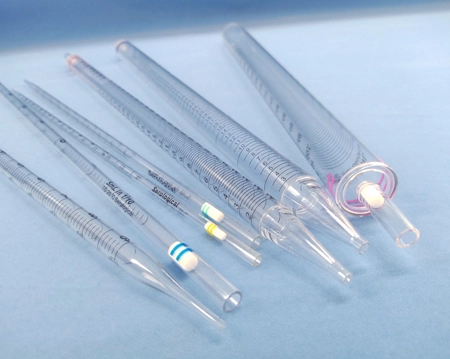What Are Filter Tips?
Filter tips are pipette tips designed for laboratories, mainly used to improve the safety and accuracy of experiments. Here are some key features and application scenarios of filter tips:
Key features
Filtering function: The filter tip is equipped with a filter inside, which can effectively prevent the formation of aerosols and the inhalation of viscous or volatile solutions, thereby protecting the pipette and sample from contamination.
Material: Usually made of transparent polypropylene (PP), it has good biocompatibility and chemical stability.
Pre-sterilization: The filter tip is pre-sterilized, pyrogen-free and DNase/RNase-free, ensuring that it is used under sterile conditions.
Application scenarios
PCR experiment: In PCR experiments, filter tips can prevent cross-contamination between samples and ensure the accuracy of PCR reactions.
Cell culture: In the cell culture process, filter tips can ensure the purity of the culture medium and avoid cell contamination.
Drug research and development: In the process of drug research and development and production, filter tips are used to handle sterile samples to ensure the reliability and safety of drug research and development.
Chemical Analysis: When performing high-precision chemical analysis and handling larger volumes of solution, the 1250µL filter tips prevent volatile or hazardous chemicals from entering the pipette, protecting the operator's safety.
Advantages
Improve safety: Filter tips can reduce the spread of harmful products and protect the personal safety of operators.
Improve accuracy: By preventing cross-contamination, filter tips help improve the accuracy of experimental data.
Extend equipment life: Filter tips can prevent liquid from rushing into the pipette, extending the service life of the pipette.
Filter pipette tips are laboratory tools for precise pipetting operations with built-in filters to prevent contamination. They are widely used as microbiology lab consumables and used in molecular biology, chemistry, and medical experiments to ensure sample purity and the reliability of experimental results. Filters can effectively block aerosol and liquid contamination, protecting samples and pipettes. Filter pipette tips are available in a variety of specifications and materials to meet different experimental needs. As a filter tips manufacturer, we are committed to providing high-quality products to ensure the accuracy and safety of experiments. Choose our filter pipette tips to make your experiments more accurate and reliable. Contact us now to improve your laboratory operation level!
 English
English  中文
中文  日本語
日本語  한국어
한국어  français
français  Deutsch
Deutsch  Español
Español  italiano
italiano  русский
русский  português
português  العربية
العربية  tiếng việt
tiếng việt 


